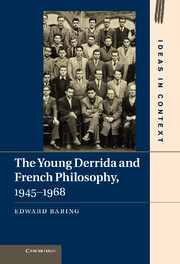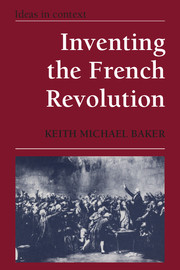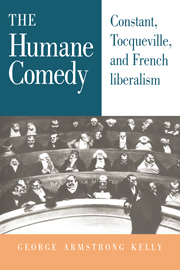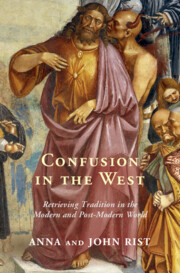The Young Derrida and French Philosophy, 1945–1968
In this powerful study Edward Baring sheds fresh light on Jacques Derrida, one of the most influential yet controversial intellectuals of the twentieth century. Reading Derrida from a historical perspective and drawing on new archival sources, The Young Derrida and French Philosophy shows how Derrida's thought arose in the closely contested space of post-war French intellectual life, developing in response to Sartrian existentialism, religious philosophy and the structuralism that found its base at the École Normale Supérieure. In a history of the philosophical movements and academic institutions of post-war France, Baring paints a portrait of a community caught between humanism and anti-humanism, providing a radically new interpretation of the genesis of deconstruction and of one of the most vibrant intellectual moments of modern times.
- An intellectual history of the philosophies, institutions and movements of post-war France
- A radical new interpretation of one of the most influential intellectuals of the twentieth century
- Draws on a wide range of new archival sources
Awards
Winner of the Journal of the History of Ideas' 2011 Morris D. Forkosch Prize for the best book in intellectual history
Reviews & endorsements
"The Derrida that Baring reconstructs is not the one we thought we knew. His reconstruction is so persuasive that the book succeeds in revising interpretations that have become truisms in Derrida scholarship … The book impresses at every level … Baring is diligent at getting things right."
Carolyn Dean, Modern Intellectual History
"[This] is an outstanding historical account. The book combines a comprehensively informed sensitivity for the context with a masterly knowledge of Derrida's thought and the broader intellectual field in which he worked. Baring's work succeeds not only in enriching enormously our knowledge of Derrida's environment in those formative years of his philosophical development. With his artful philosophical readings, that are closely entwined with a contextual history of ideas, it changes our understanding of his thought."
Warren Breckman, translated from Zeitschrift für Ideengeschichte
"A thought-provoking landmark in Derrida criticism."
Laurent Milesi, Modern and Contemporary France
"… [a] meticulous archival reconstruction of [Derrida's] early intellectual itinerary."
Peggy Kamuf, Los Angeles Review of Books
"[An] impressive contribution to the long-awaited historiography of French theory."
Julian Bourg, American Historical Review
"… an exemplary work of intellectual history … [providing] virtuoso analysis of Derrida's writings, from his early essays to his mature works of the mid-sixties."
Michael Kelly, H-France
"It is hard to imagine this work being superseded as an intellectual biography of Jacques Derrida, and indeed of post-war French intellectual history, up to the May '68 uprisings."
Patrick Madigan, The Heythrop Journal
"… complex, learned … [an] erudite book."
Jonathan Judaken, The Journal of Modern History
"In this masterful book, [Baring] achieves the best picture available of the origins of deconstruction."
Samuel Moyn, Jewish Review of Books
"[An] exciting reinterpretation of Derrida's early years."
Emile Chabal, Books and Ideas
"Baring's clear and engaging style makes the book accessible to students, and, standing relatively independent, individual chapters or subsections would make excellent secondary reading in graduate and advanced undergraduate classes."
Samir Haddad, Notre Dame Philosophical Reviews
Product details
November 2011Hardback
9781107009677
350 pages
229 × 152 × 21 mm
0.64kg
1 b/w illus.
Available
Table of Contents
- Introduction
- Part I. Derrida Post-Existentialist:
- 1. Humanist pretensions: Catholics, Communists and Sartre's struggle for existentialism in post-war France
- 2. Derrida's 'Christian' existentialism
- 3. Normalization: the École Normale Supérieure and Derrida's turn to Husserl
- 4. Genesis as a problem: Derrida reading Husserl
- 5. The God of mathematics: Derrida and the origin of geometry
- Part II. Between Phenomenology and Structuralism:
- 6. A history of différance
- 7. L'ambiguité du concours: the deconstruction of commentary and interpretation in Speech and Phenomena
- 8. The ends of man: reading and writing at the ENS
- Epilogue.






